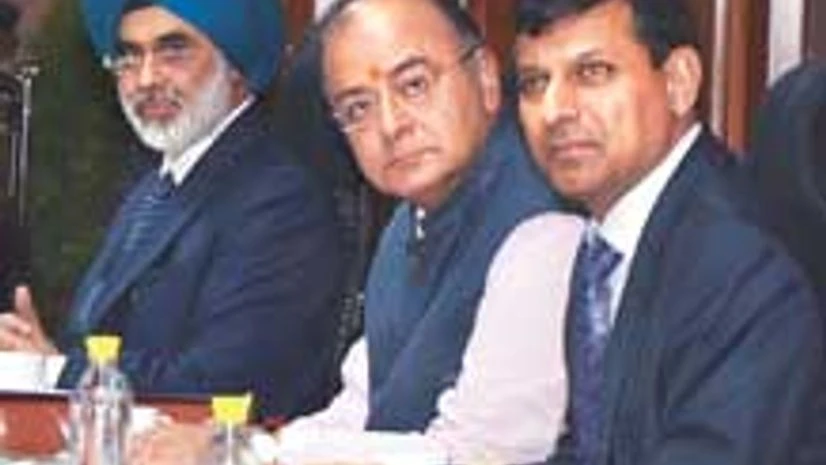Finance Minister Arun Jaitley on Sunday refrained from overtly nudging the Reserve Bank of India (RBI) to cut the policy rate to spur growth, at a meeting of the central bank's board.
A rate cut by RBI seems unlikely in the current calendar year. Governor Raghuram Rajan said their monetary stance is on target and might not change unless macroeconomic data suggest otherwise.
Earlier this week, when Rajan had said at the recent policy review that the central bank would not hold interest rates higher longer than warranted if disinflation persisted, Jaitley had said the recent data showed inflation was moderating.
More From This Section
After the meeting on Sunday of the RBI board, with Jaitley presiding, the governor reiterated at a press conference that the current interest rate policy was on course to meet the targets on inflation. "At this point, uncertainty is two-way...If news comes on either side, we can change what the policy is. But, as of now we think the policy is on target. This is contingent on data coming in," said Rajan.
The policy regime, Jaitley said in his address to the board, was being geared to attain higher growth, lower inflation and sustainable external balance in the backdrop of sub-five per cent annual growth in the past two financial years.
Answering queries from journalists over reports of RBI's reservations on some issues relating to the Budget announcement on a modern monetary policy framework, Rajan said the central bank would discuss this with the finance ministry through the course of the year. "We have started a preliminary discussion. The finance ministry would develop the framework," he said.
The governor said the central bank's move to cut the Statutory Liquidity Ratio (SLR) by 50 percentage points would not immediately result in a credit pick-up by the private sector.
"Over time, as the private sector and public sector start investing more, you will see that credit growth picks up. Also, the fact that we cut SLR does not necessarily mean that immediately they will transfer those resources out of government bonds. Over time, you will also see new demand coming up for government bonds," Rajan said.
On whether the government was thinking of steps to correct the functioning of public sector banks (PSBs) in the aftermath of the arrest of Syndicate Bank chairman S K Jain over graft charges, Jaitley said, "Banks already know what they are doing. If some stringent steps are required, it would be done. But, what was allegedly happening was certainly in contravention of the legal framework. It was a crime."
He said the functioning of PSBs could be one cause for the high non-performing assets of these lenders but the economic condition is also a reason.
When asked if the government's financial inclusion plans could face obstacles as some banking business correspondents were untraceable, Financial Services Secretary G S Sandhu said this model had many problems earlier but his department had tried to resolve those issues.
"One of the problems was inadequate remuneration to banking correspondents. Some were paid just Rs 2,000-3,000 (a month) only. They can't survive on that. Now, we have stipulated that a minimum Rs 5,000 would be paid," he said.
Prime Minister Narendra Modi is expected to announce a financial inclusion programme by his government in his Independence Day speech.
On the year's fiscal deficit target having already crossed 56 per cent of the Budget Estimate in the first three months of 2014-15, Jaitley said these were monthly numbers and as the year progressed, receipts and expenditure would even out.
The RBI board approved the transfer of a surplus amounting to Rs 52,679 crore for the year ended June 30, 2014, to the Union government, against Rs 33,010 crore in the previous year. The surplus transfer, the highest ever, will be effected on Monday.
Jaitley said the government had given a clear target for disinvestment proceedings in the Budget and the department of disinvestment was preparing a schedule. The Budget set a target of Rs 58,425 crore from disinvestment in 2014-15.

)
